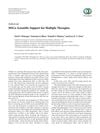2 citations,
November 2007 in “Clinics in dermatology” Tofacitinib may be an effective and safe treatment for adolescent alopecia areata.
 May 2023 in “Journal of Clinical Medicine”
May 2023 in “Journal of Clinical Medicine” New understanding and treatments for hair loss are improving, but more research is needed.
[object Object]  January 2024 in “Elsevier eBooks”
January 2024 in “Elsevier eBooks” Increasing regulatory T cells may help treat alopecia areata by reducing autoimmunity and promoting hair growth.
53 citations,
June 2020 in “The journal of allergy and clinical immunology/Journal of allergy and clinical immunology/The journal of allergy and clinical immunology” Animal models help study psoriasis but have limitations and don't fully mimic the human disease.
 15 citations,
January 2018 in “Acta dermato-venereologica”
15 citations,
January 2018 in “Acta dermato-venereologica” Skin treatment can lower life quality for patients with skin conditions.
 1 citations,
June 2001 in “Annals of Internal Medicine”
1 citations,
June 2001 in “Annals of Internal Medicine” The document concludes that there is no credible evidence that distant healing works, and it should not be further studied in medical literature.
[object Object] March 2024 in “Biomedicines” Mesenchymal stem cells show promise for effective skin repair and regeneration.
64 citations,
January 2001 in “Pharmacotherapy The Journal of Human Pharmacology and Drug Therapy” Misoprostol has many medical benefits, including protecting against injuries, aiding in disease treatment, and improving drug effects.
 3 citations,
March 2023 in “Life”
3 citations,
March 2023 in “Life” Obesity can worsen wound healing by negatively affecting the function of stem cells in fat tissue.
41 citations,
May 2020 in “Frontiers in immunology” Hidradenitis suppurativa might be a type of autoinflammatory skin disease.
 20 citations,
November 2019 in “Current Opinion in Systems Biology”
20 citations,
November 2019 in “Current Opinion in Systems Biology” The document concludes that computational models are useful for understanding immune responses and could improve cancer immunotherapy.
 January 2024 in “International Journal of Dermatology”
January 2024 in “International Journal of Dermatology” Targeting Interleukin-13 could help treat alopecia areata linked with atopic dermatitis.
33 citations,
October 2013 in “PloS one” Human sweat glands have a type of stem cell that can grow well and turn into different cell types.
 1 citations,
September 2010 in “The journal of investigative dermatology/Journal of investigative dermatology”
1 citations,
September 2010 in “The journal of investigative dermatology/Journal of investigative dermatology” The meeting highlighted major advances in skin research, including new findings on skin microbes, genetic links to skin diseases, and improved treatments for various conditions.
New treatments for alopecia areata, like JAK inhibitors and immunomodulators, are promising.
 May 2024 in “Frontiers in Immunology”
May 2024 in “Frontiers in Immunology” Type-2 immunity may influence skin diseases and could be targeted for treatment.
 31 citations,
April 2019 in “Experimental and Therapeutic Medicine”
31 citations,
April 2019 in “Experimental and Therapeutic Medicine” β-blockers can cause skin problems like psoriasis and vitiligo, and doctors should tell patients about these risks.
 9 citations,
December 2017 in “The Journal of Allergy and Clinical Immunology”
9 citations,
December 2017 in “The Journal of Allergy and Clinical Immunology” New targeted therapies for hair loss from alopecia areata show promise, with personalized treatment expected in the future.
 130 citations,
November 2017 in “Frontiers in Immunology”
130 citations,
November 2017 in “Frontiers in Immunology” The conclusion is that Treg-targeted therapies have potential, but more knowledge of Treg biology is needed for effective treatments, including for cancer.
 January 2023 in “Discovery immunology”
January 2023 in “Discovery immunology” T cells and bacteria in the gut and skin help maintain health and protect against disease.
 23 citations,
January 2020 in “Central-European Journal of Immunology/Central European Journal of Immunology”
23 citations,
January 2020 in “Central-European Journal of Immunology/Central European Journal of Immunology” Alopecia areata, a type of hair loss, is likely an autoimmune disease with a genetic link, but its exact cause is still unknown.
 55 citations,
July 2016 in “Dermatologic Therapy”
55 citations,
July 2016 in “Dermatologic Therapy” Multiple treatments work best for hair loss.
 36 citations,
September 2009 in “Journal of Cellular and Molecular Medicine”
36 citations,
September 2009 in “Journal of Cellular and Molecular Medicine” New treatments targeting skin stem cells show promise for skin repair, anti-aging, and cancer therapy.
 28 citations,
September 2015 in “Wiener Klinische Wochenschrift”
28 citations,
September 2015 in “Wiener Klinische Wochenschrift” New skin substitutes for treating severe burns and chronic wounds are being developed, but a permanent solution for deep wounds is not yet available commercially.
 13 citations,
January 2015 in “Stem cells international”
13 citations,
January 2015 in “Stem cells international” Mesenchymal Stem Cells (MSCs) are promising for multiple therapies, but more research is needed to fully understand and optimize their use.
 11 citations,
May 2021 in “Journal of Medical Virology”
11 citations,
May 2021 in “Journal of Medical Virology” Men are more likely to have severe respiratory viral infections like COVID-19 due to hormonal and genetic differences, while women generally have stronger immune responses.
 9 citations,
April 2021 in “Frontiers in Immunology”
9 citations,
April 2021 in “Frontiers in Immunology” Unconventional lymphocytes are important for quick immune responses and healing of skin and mucosal barriers.
 5 citations,
January 2015 in “Evidence-based complementary and alternative medicine”
5 citations,
January 2015 in “Evidence-based complementary and alternative medicine” Adding licorice gel to laser treatment is more effective for reducing facial hair than laser alone.
 4 citations,
November 2023 in “Frontiers in immunology”
4 citations,
November 2023 in “Frontiers in immunology” New treatments targeting T-cell pathways are needed for better alopecia areata management.
 January 2019 in “Springer eBooks”
January 2019 in “Springer eBooks” Transplanting skin cells is a safe, effective, and affordable treatment for vitiligo.






















